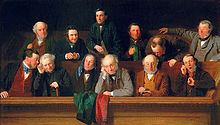Jury

A jury is a group of ordinary people, who aren't employees of the court, who decide the answer to a question in a court room. Usually, this question is whether a person is guilty or innocent of committing a crime. A jury may also be responsible for deciding a penalty for the person if they are found guilty. Normally, all members of the jury have to agree on the decision. Sometimes, the jury can still make a decision even if a few members don't agree with it. However, if the jury is quite clearly divided, the result is known as a hung jury and the case is not decided. A member of a jury is called a juror. A juror is supposed to be impartial. This means that he or she is to be fair and listen to both sides of the story without deciding what side they will take ahead of time. Some people can not become members of a jury and others have the right to ask not to be made a member. People who can not be members are those which have a mental illness and people who can ask not to be made a juror include doctors and religious persons.
Jury Nullification
Under the common law juries have a right that is not often used. If they think that the law under which a person is charged is wrong they can use jury nullification to set the person free. Whilst this is a right juries have it is unlawful for a lawyer to explain this to a jury, they must know about it on their own.
Types of juries
In the United States there are primarily two types of juries which are the finder of facts in a trial:[1]
- A petit jury also called a trial jury is one made up of from 6 to 12 jurors.[1]
- A grand jury is called by a prosecutor to decide if there is probable cause to believe someone has committed a crime. If so, the grand jury returns an indictment against the defendant.[1]
Juries by country
A jury in the United Kingdom is made up of 12 people for criminal cases and 10 people for civil cases (or 15 people in Scotland) these people are selected at random and are British citizens with no criminal record. Members are chosen from the electoral register for their local area and those chosen must attend jury duty.
In the United States, juries are made up of 12 regular people from the area in which the trial is held and are not members of the court system. They are paid a small amount for their service.
Text is available under the CC BY-SA 4.0 license; additional terms may apply.
Images, videos and audio are available under their respective licenses.
